
The newspaper edition in this photo of newsboys from Bogota, Columbia is dated Tuesday, 11 July 1972. The lead headline concerns readjustment of coffee prices.
(018sa)


Some children worked long hours as street vendors and likely would the entirety of their lives.
(002sa)

This baby was named Thorn. The baby’s parents were American hippies. I photographed him in the northern border town of Tulcán, Ecuador in the spring of 1971. It was cold there in the mountains. There had been some kind of uprising in the province. My notes say that eight people were killed and 28 injured. So, several of us foreigners were stuck in a very cheap hotel with no heat, but lots of bugs (scratch).
(001sa)
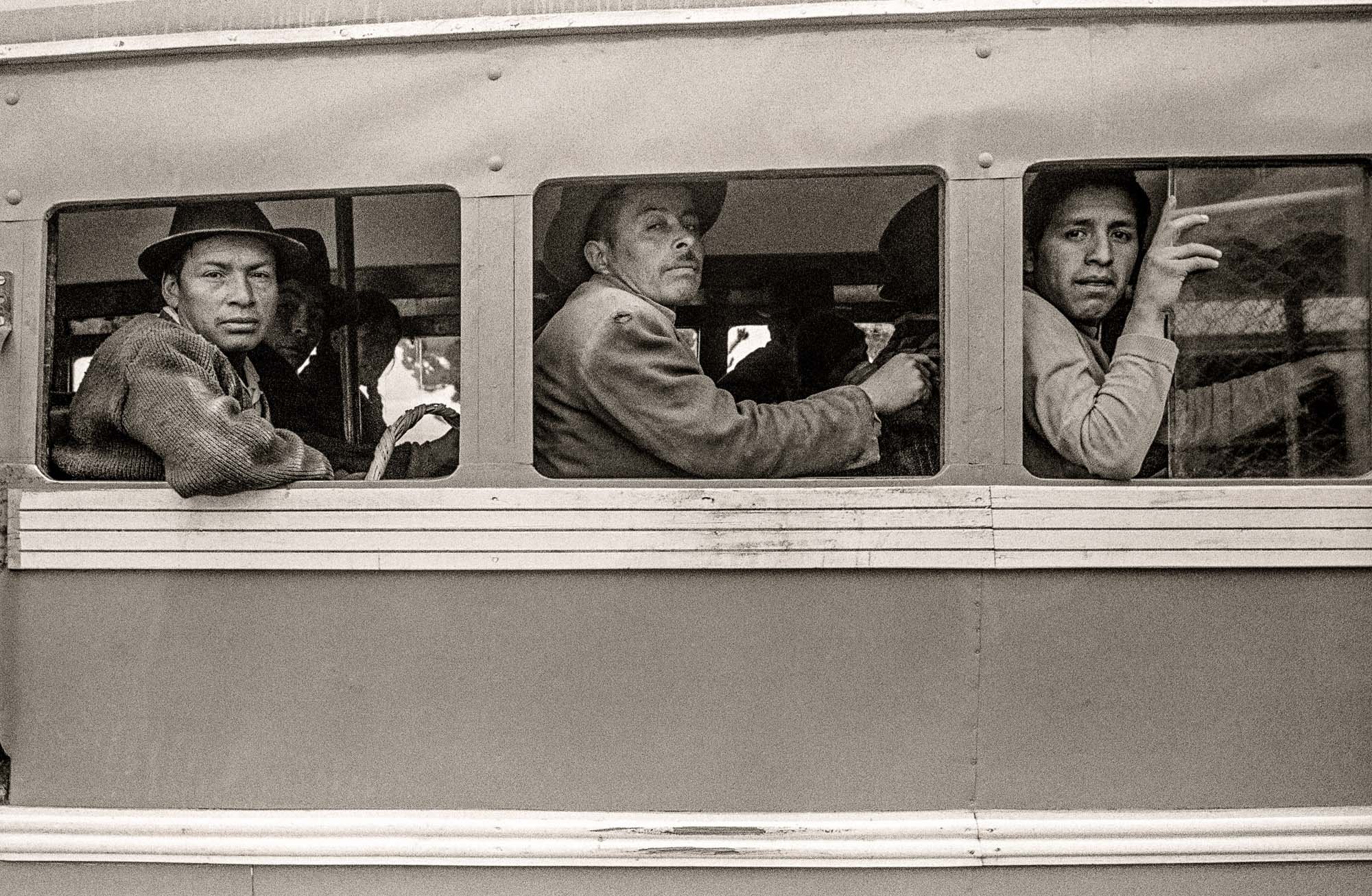
Looking at this image now, it reminds me of a famous photo on the cover of Robert Frank’s book, “The Americans.” I guess this photo could be “The South Americans.”
(009sa)
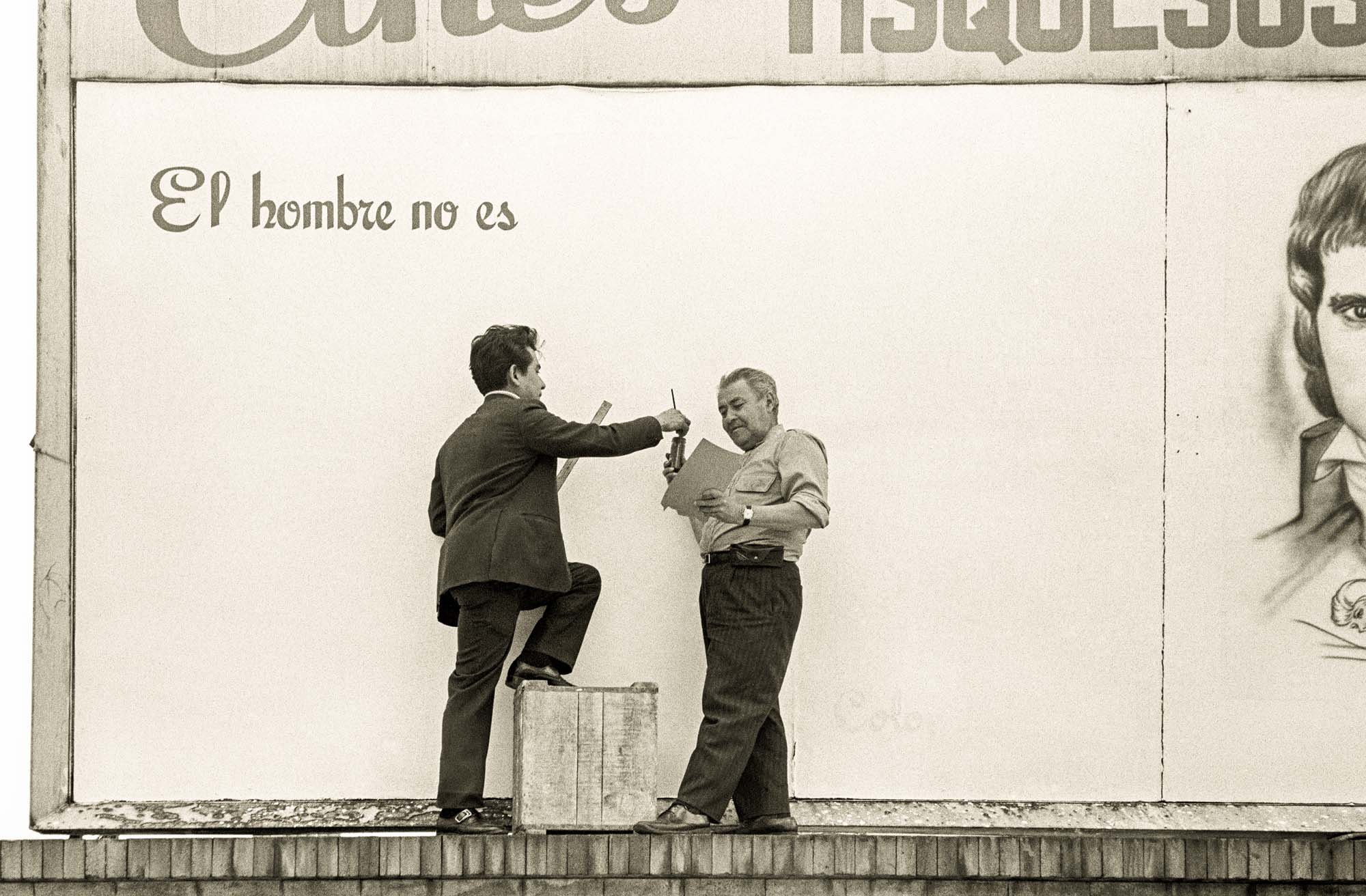
Turning a street corner, I saw this image developing. I was (and am still) excited by the moment. I saw it as a Cartier-Bresson type of decisive moment. “The man is not...” I left before the sign painter answered that existential (?) question.
(006sa)
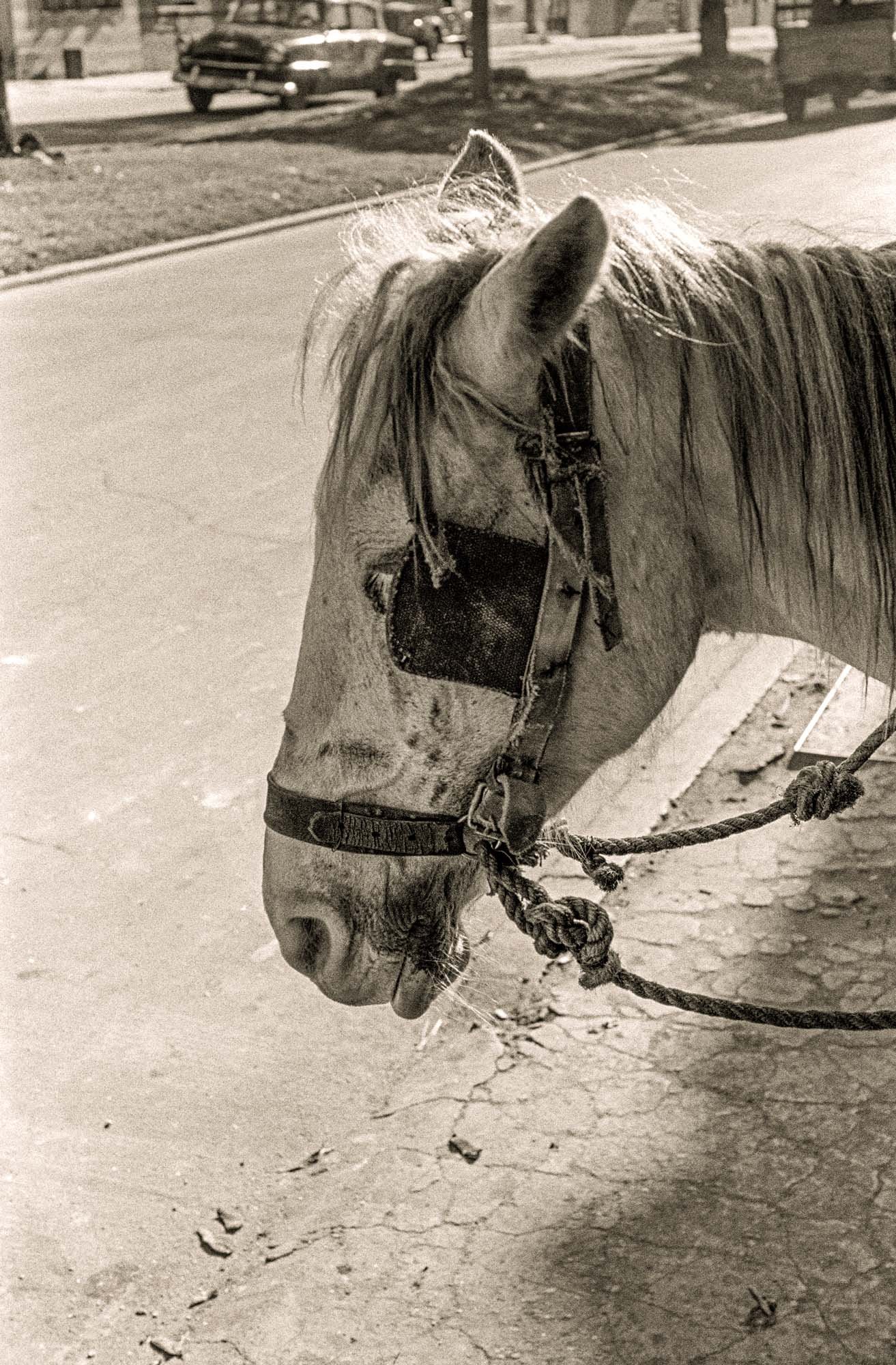
(008sa)
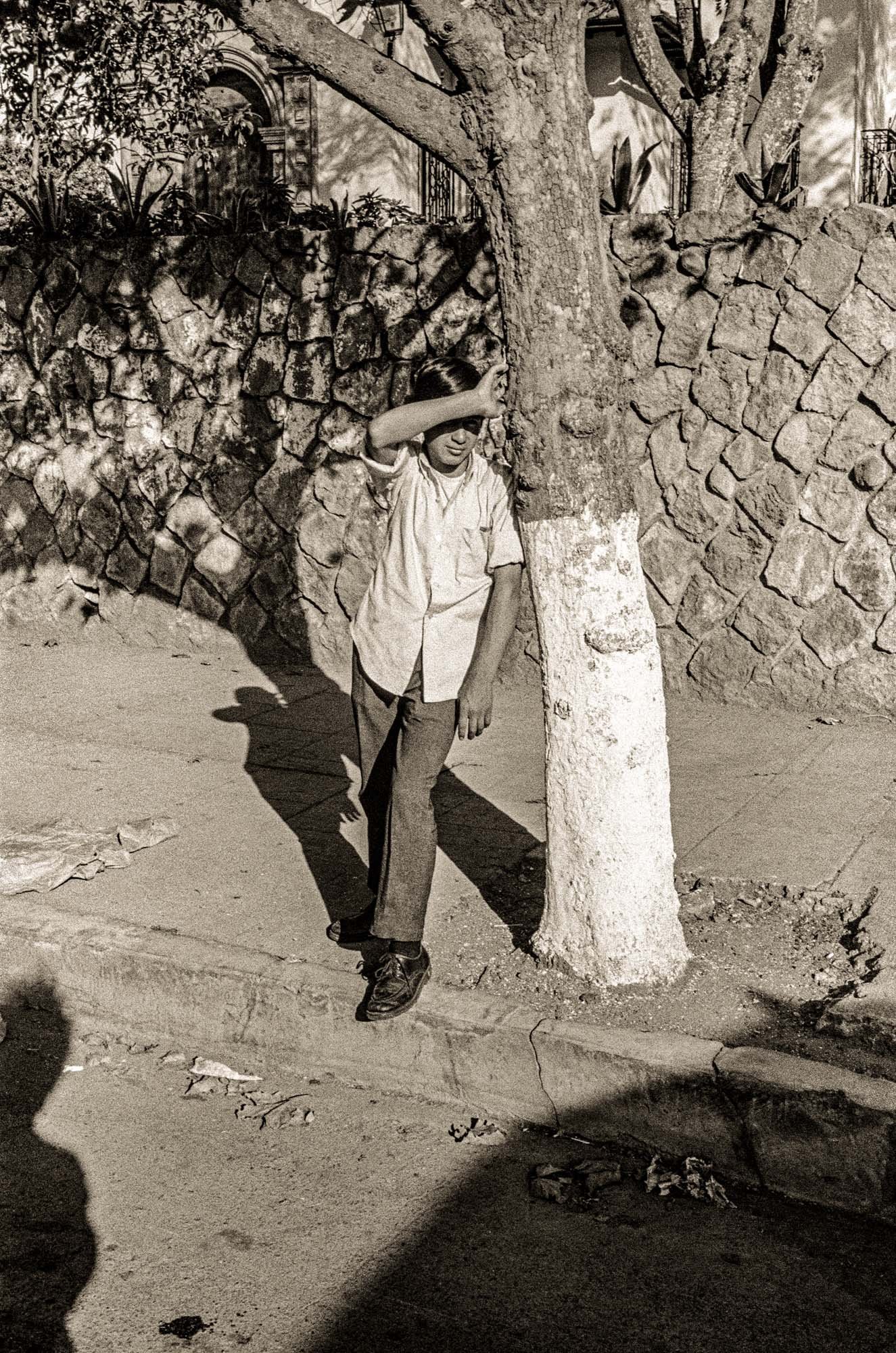
Certain scenes I came upon were thought-provoking to me because of shadow and light shapes that bounced to the either end of the value scale and made mid-tones become the backdrop. My thinking was shaped by artist/photographers like Bill Brandt and Manuel Álvarez Bravo.
(011sa)
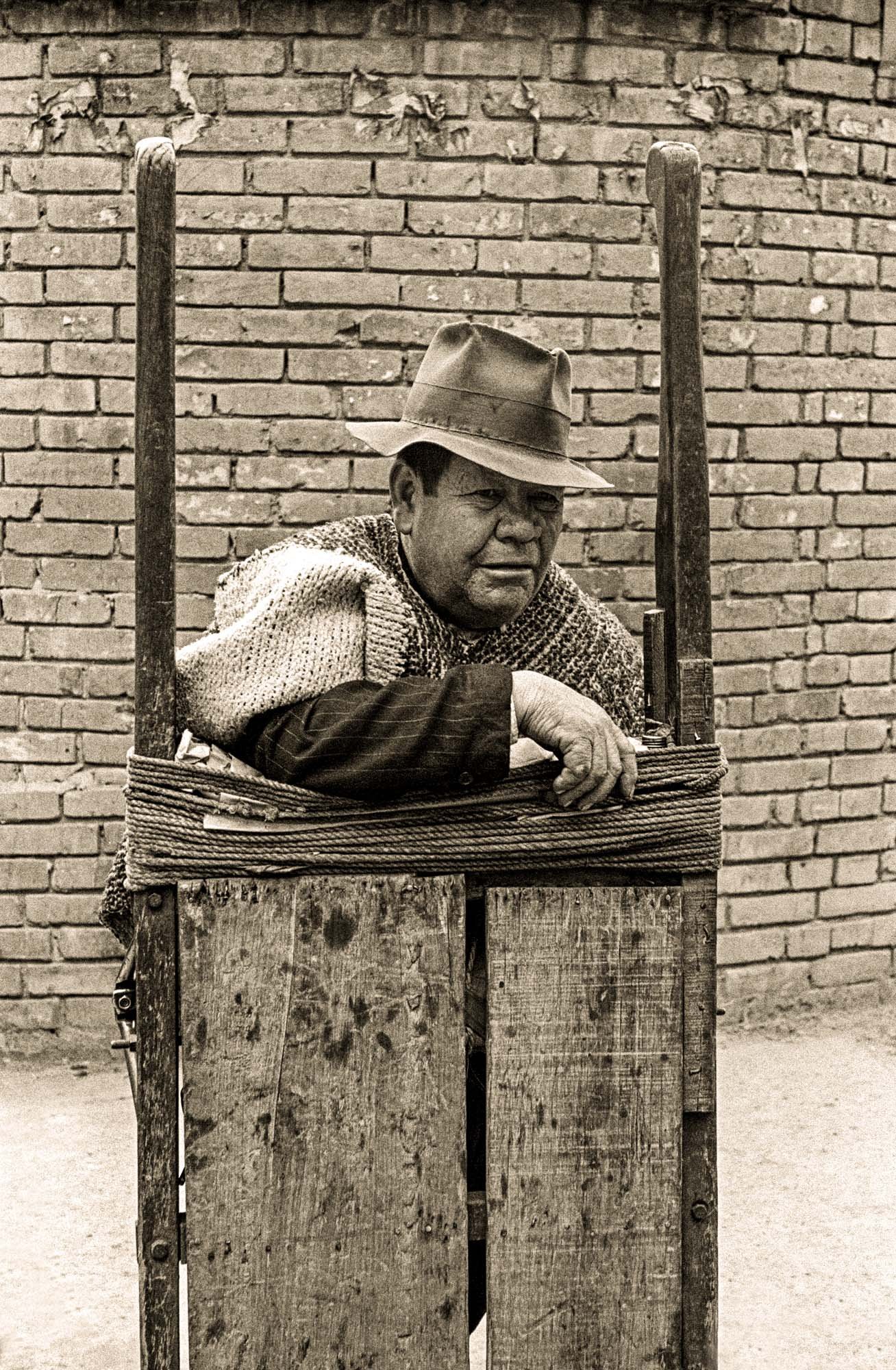
(007sa)
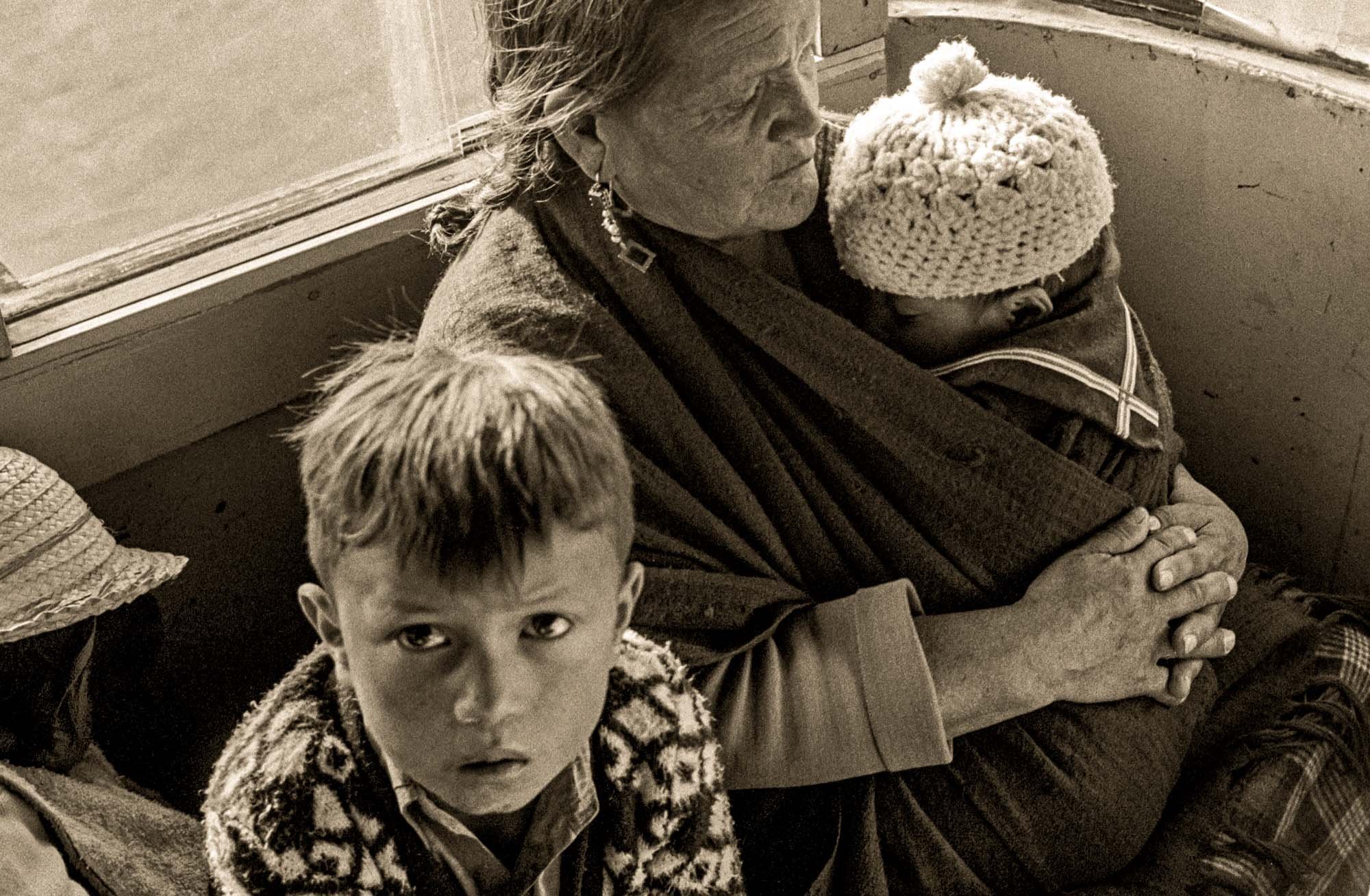
(012sa)
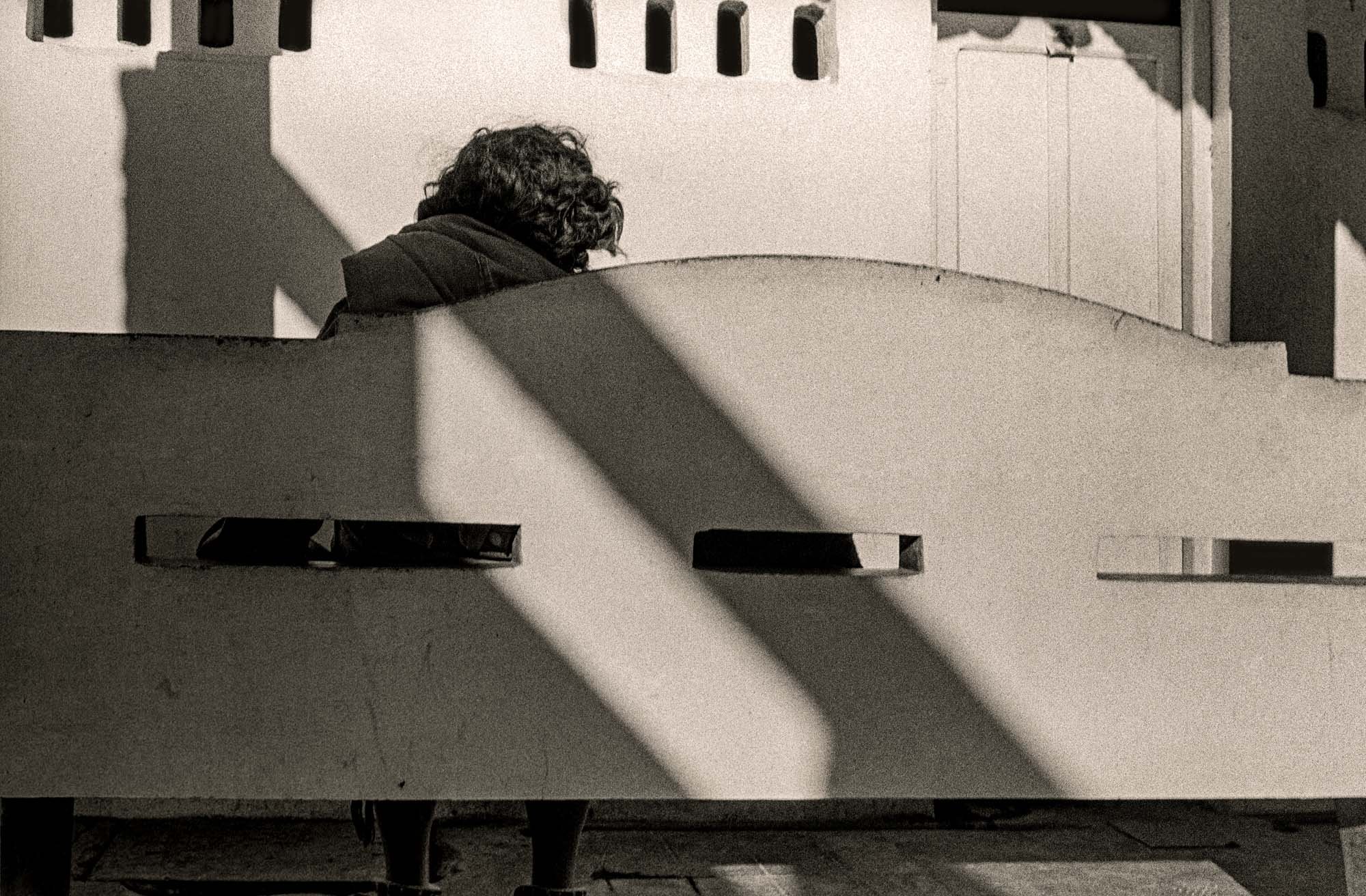
The mineral-rich springs at Baños, Ecuador were very relaxed. No tourists or foreigners to speak of in those days. This woman is waiting her turn in the sun and shadows on a bench outside of a bathing room.
(013sa)
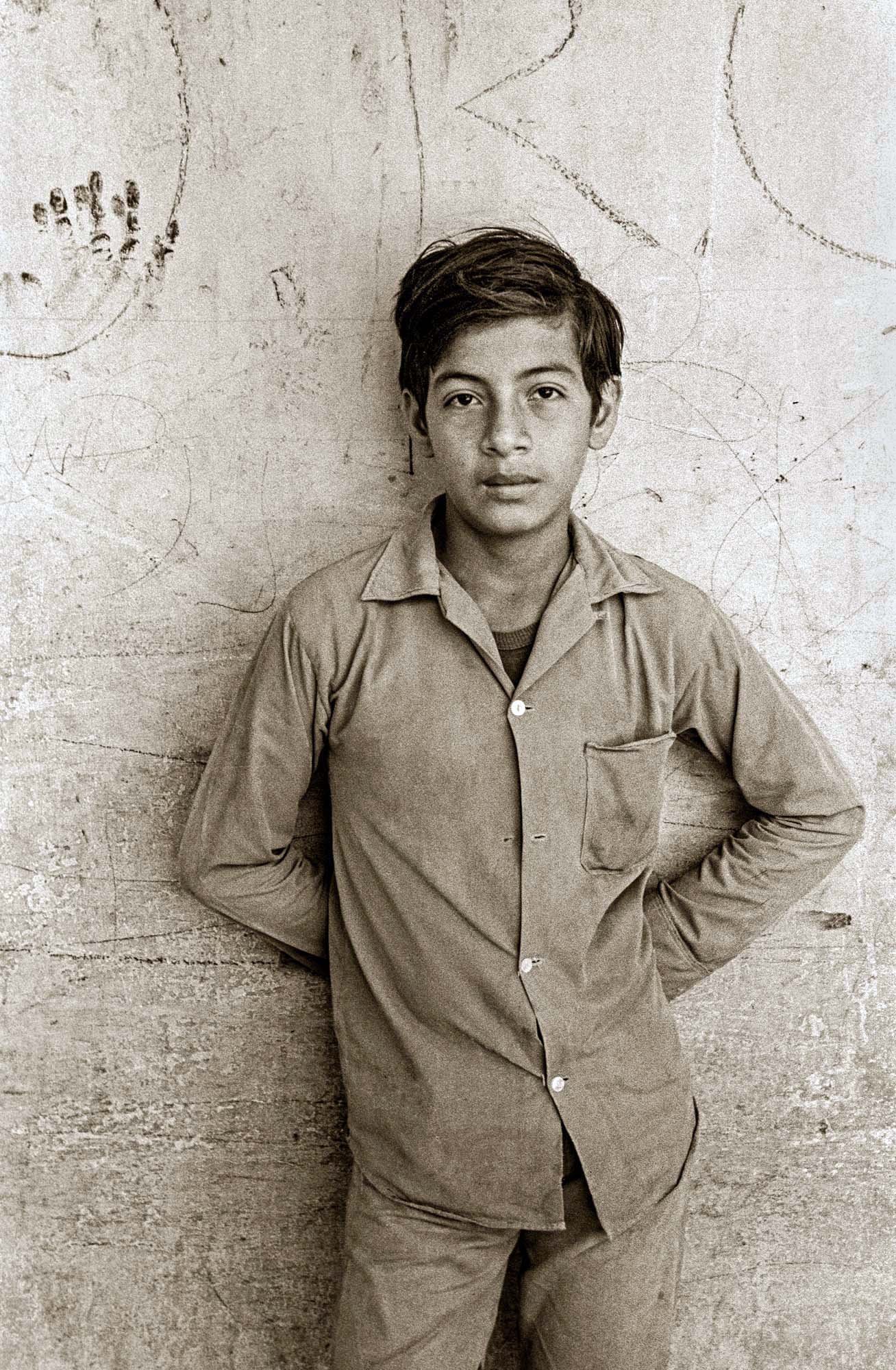
(014sa)
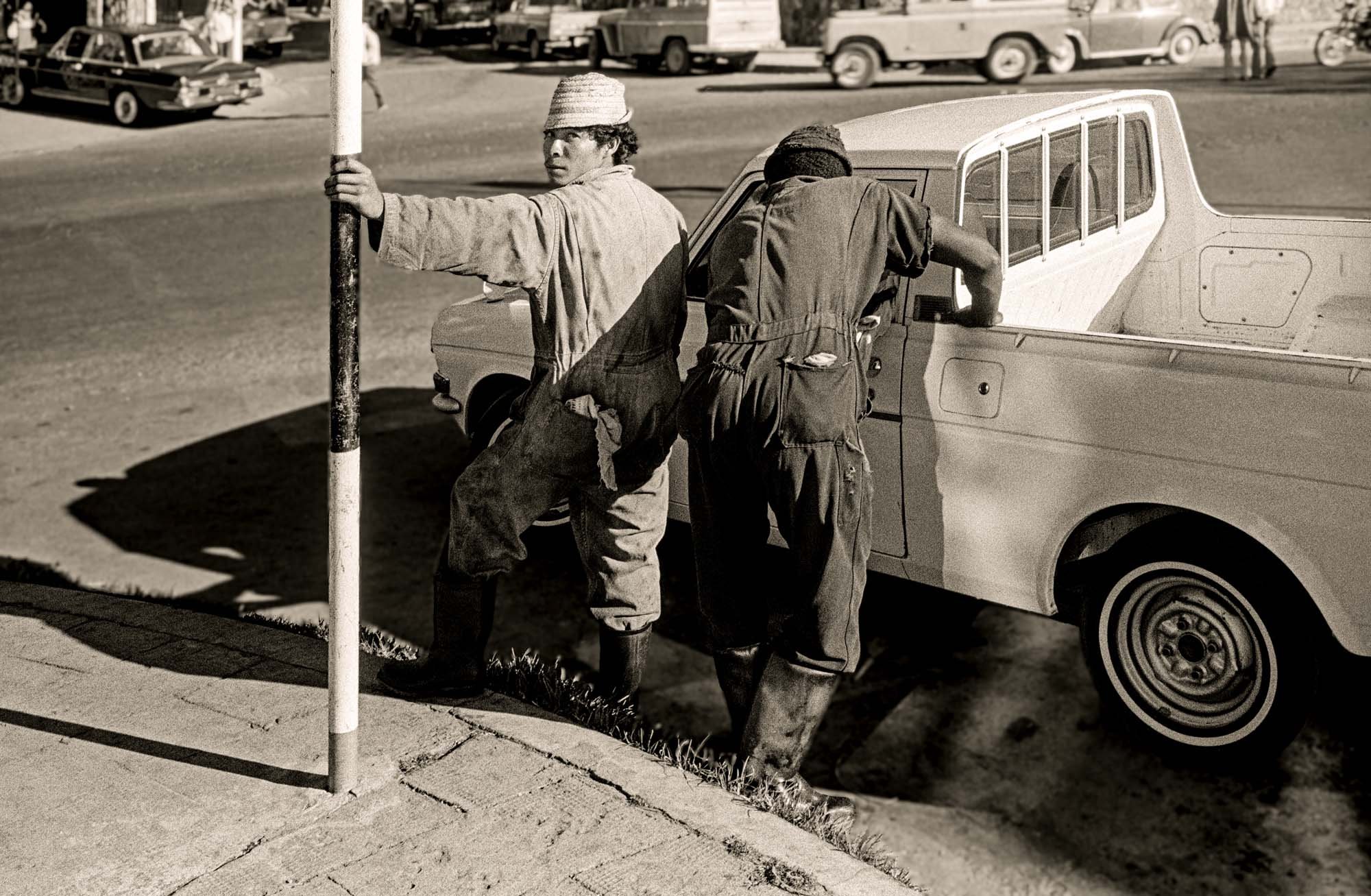
(010sa)
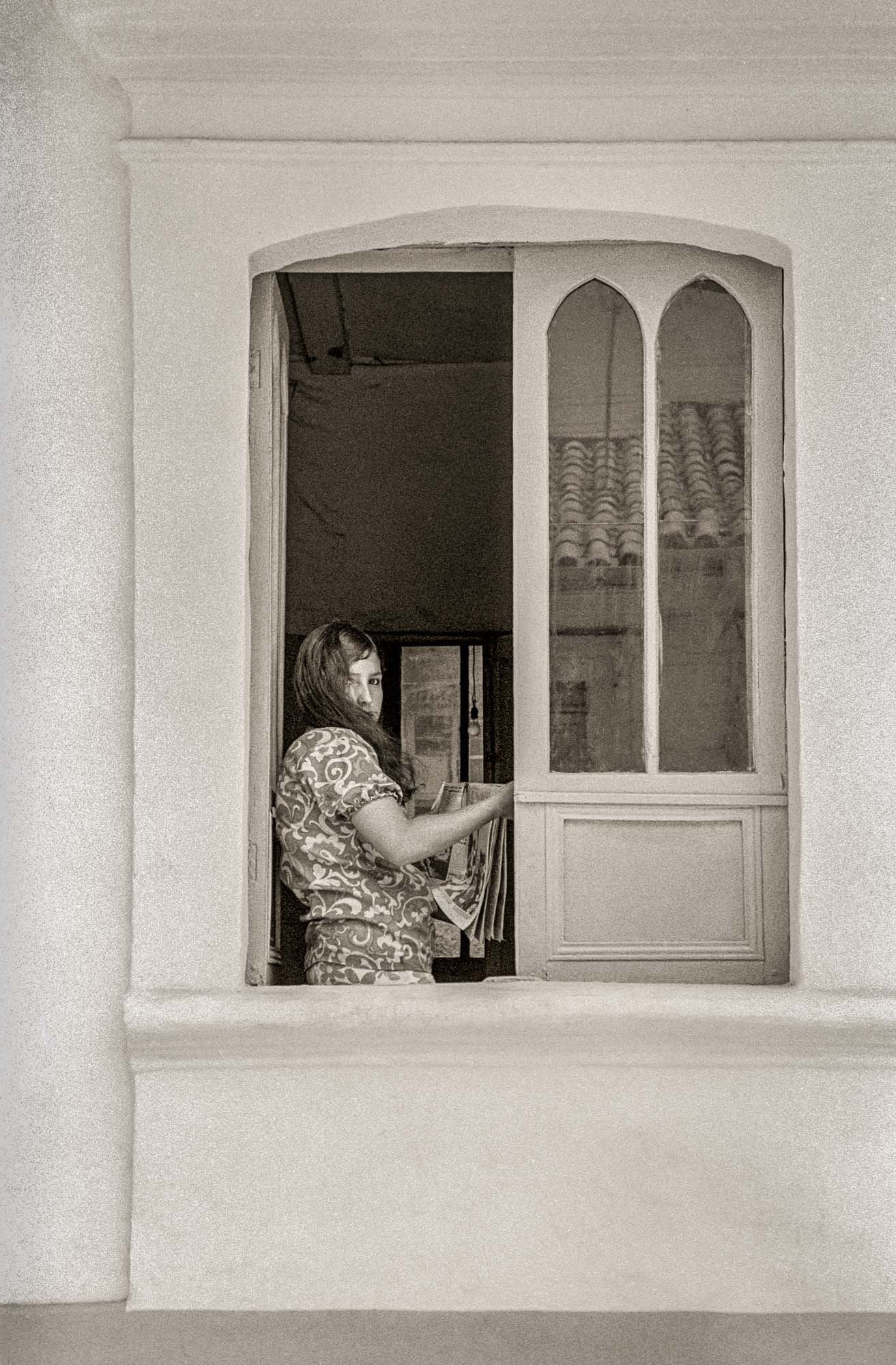
One day I took by an image of young woman framed in a window that I liked. A very few minutes later I came upon a different image of businessmen walking in front of an Avianca billboard (118sa) that conveyed an entirely separate feeling. I recall thinking how unusual it was to come upon two disparate images I liked so much in such a short time frame.
(015sa)
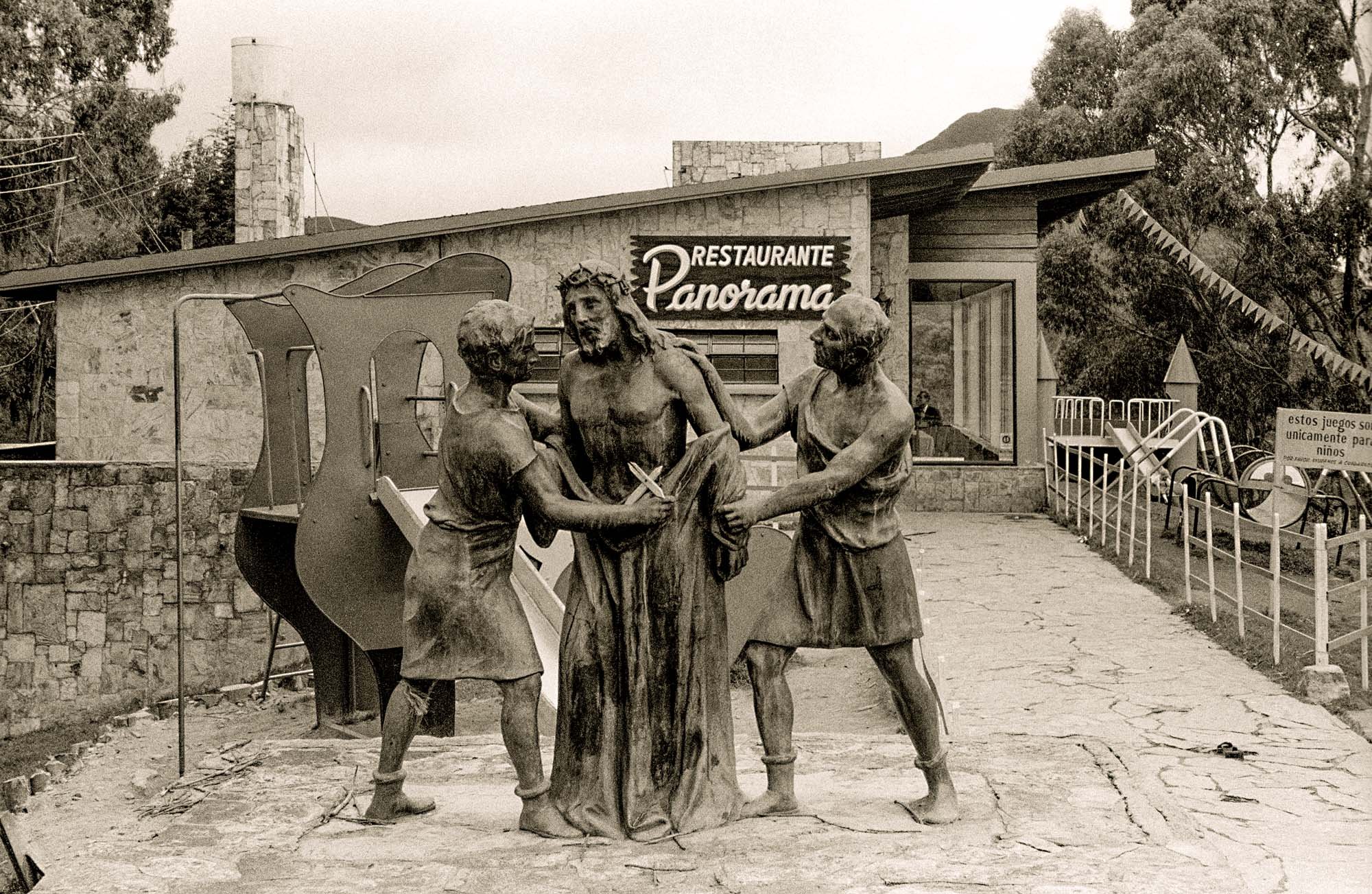
(016sa)
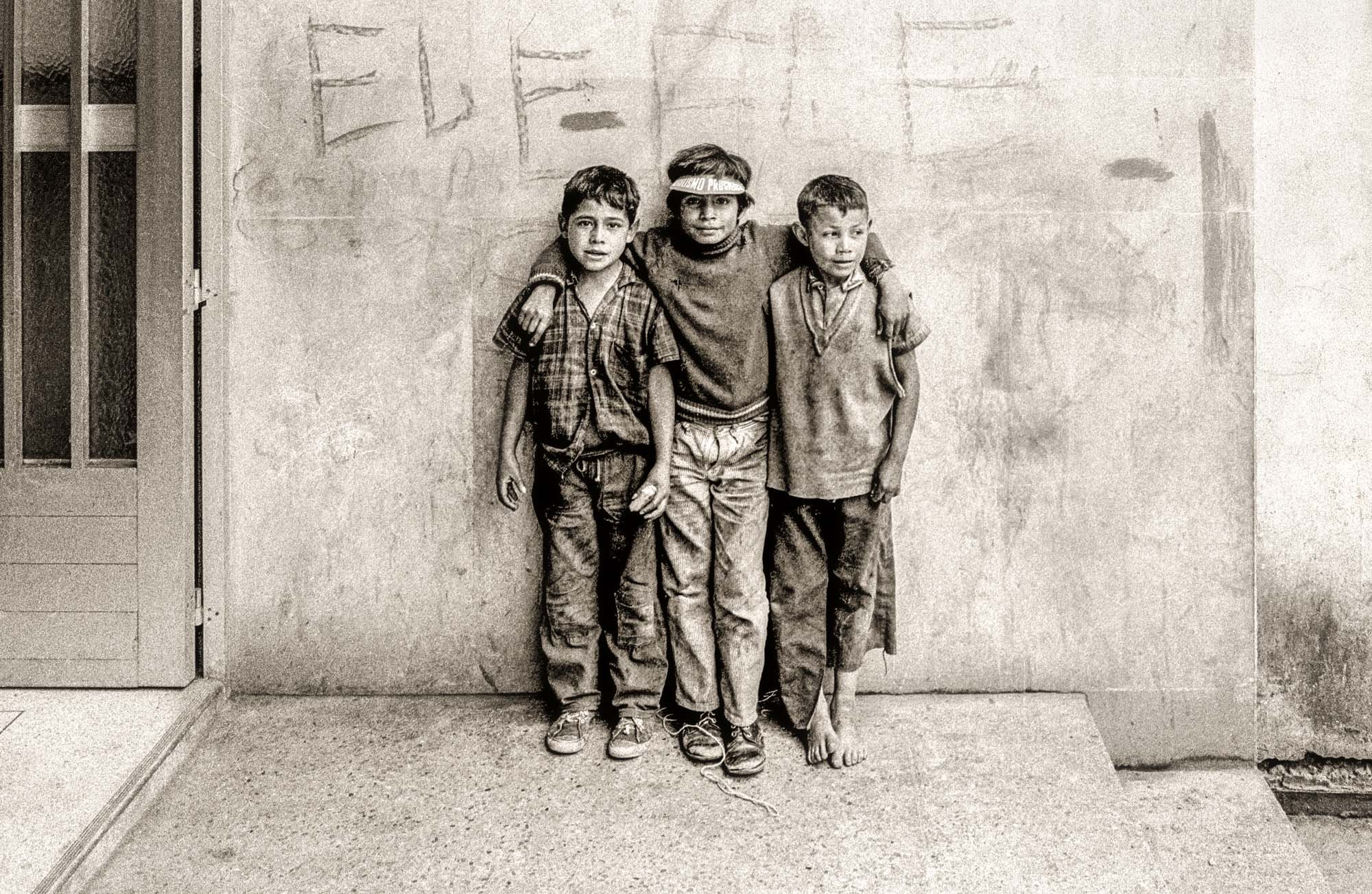
(017sa)
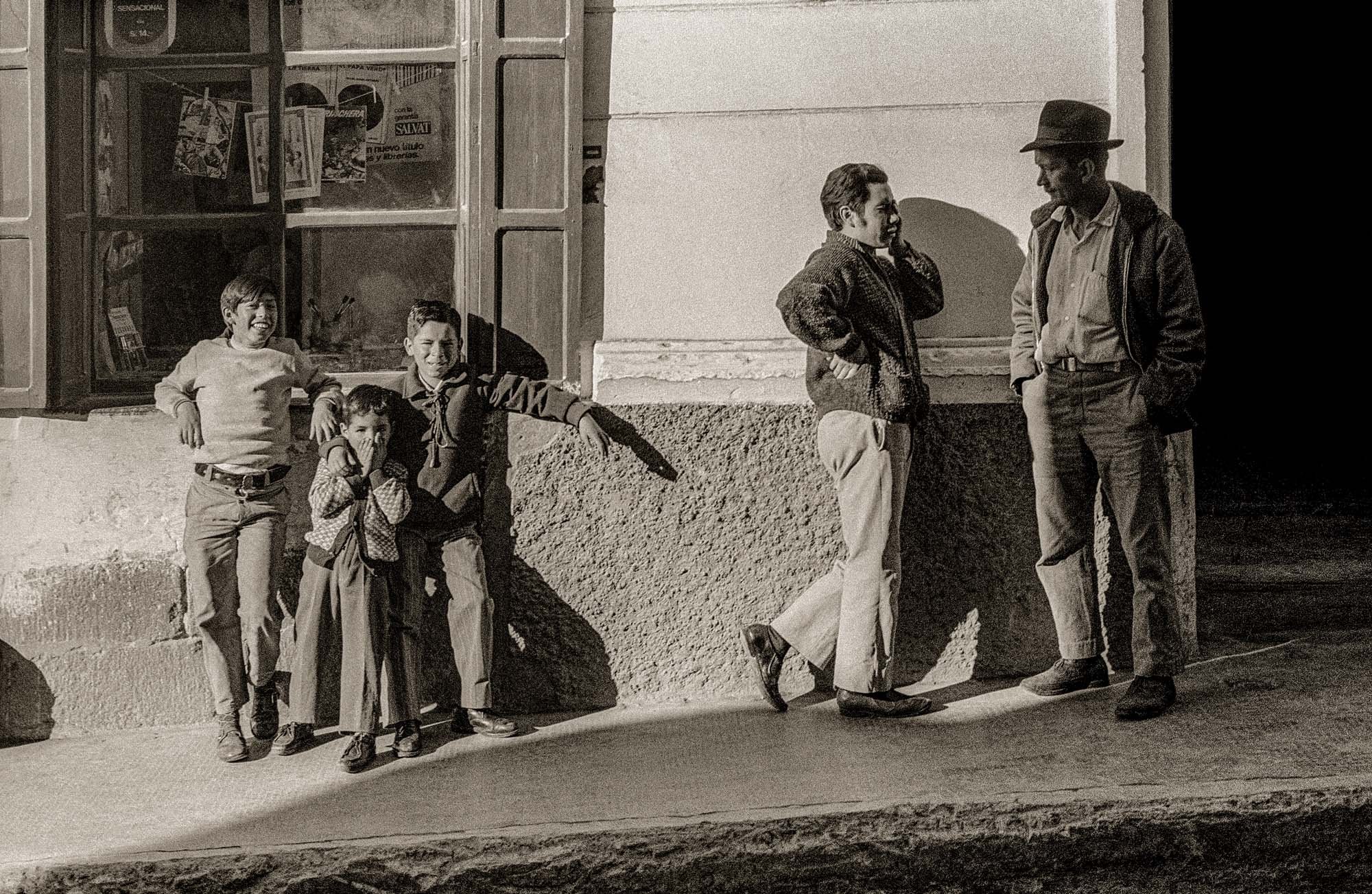
I liked the little gatherings of kids in front of doorsteps and storefronts. The kids had a separate world even when there were adults nearby.
(019sa)

This was the window of the room where I stayed for awhile in a Casa Rio in the Napo River Valley. (021sa)

(022sa)

(023sa)

Families and close neighbors looked to be so sympathetic of one another. It was delightful to watch.
(024sa)

Often I photographed without direct interaction but other times, especially with children, I asked permission directly (114sa) and tried to photograph quickly before they could “pose.”
(025sa)

(026sa)

(027sa)

Lots of boys made a little money shining shoes instead of going to school.
(028sa)

(029sa)

I would often walk for hours consciously preparing to take a photo and only shoot maybe one image. I had a limited amount of film and money and didn’t want to shoot snapshots or take photos that didn’t excite me.
(030sa)

(031sa)

(032sa)

(033sa)

(034sa)

035sa)

(036sa)

(037sa)

(038sa)

(039sa)

(041sa)

(042sa)

I don't recall that “street photography” was a term that photographers used often in the 1970s. It's a pretty good term though. Typically, these types of photos aren't documentary. Neither are they photos that concentrate on snapshots, art, nor the craft of photography. Even so, street photos can be any of these things.
(043sa)

You take photos in the present, but they will always be viewed as the past. Outside of the cities, some places looked older even then. The present looked like the past before the photo. I think the dust made a patina.
(045sa)

(046sa)

(047sa)

I almost always estimated the distance and depth of field rather than take time to focus. For that reason, I most often used the 35mm lens as I was most comfortable with it and the depth of field was a little better than a 50mm (normal) lens. I also had a 28mm but found that it tended to distort when I worked close to a subject as I like to do.
048sa)

(049sa)

Images of store windows, with or without people, were fascinating to me. The arrangements, the styles, the objects, manikins, and hats are cultural artifacts and sometimes art. I’m sure the work of Eugene Atget, a pioneer of photography, has always influenced my awareness of the artifacts of the street.
(050)

(051sa)

(052sa)

You see an image. You remember a visual detail. You relive an experience. Resurrecting old negatives gives reflection; the images had almost disappeared. That’s something to be grateful for.
(053sa)

(054sa)

(055sa)

(056sa)

(057sa)

This photograph was taken while traveling in bad weather in a large motorized canoe. We found this woman on the Napo River in Ecuador. I never found out how she died.
(058sa)

(059sa)

(060sa)

(061sa)

Processions were very common on saints’ days even in smaller towns. (062sa)

There was lots of foot traffic along the streets of places I walked. Children sat in doorways or stood in entranceways or along sidewalks watching adults go by and enjoyed anyone that distracted in any fashion.
(063sa)

I was trained in the zone exposure system but decided to never use a hand-held light meter when I took street photos. (There were no light meters in these rangefinder cameras.) I wanted to think about the light and set the f/stop-shutter speed combination by eye as I walked around. Usually that worked out OK, but more often than I’d wished my exposure of the negative was off a bit. Even so, I think if I had done it another way, I may have missed some images.
(064sa)

Don’t you wonder what this boy was thinking?Was it trivial? Was it important? Would we had understood more about his life if we had known what occupied his thoughts?
(065sa)

Looking at these photos of the street some of the people seem so involved with their occupations that one forgets they may have long since passed. Some of the occupational tasks are also passing.
(066sa)

The image of the little boy and the cow (2 cows actually) walking on a stone/dirt road occurred where I was living in the outskirts of Quito, Ecuador is visually deceptive . At first take it appeared that the little boy was driving some livestock up the road. Then I realized the mom and dad were hunched over under their loads and appeared to be beasts of burden themselves.
(091sa)

These must be the two cutest kids ever. Many houses in South America are built around a courtyard where children play and feel safe from the hazards of the street. (067sa)

To get out of cities safely, I would take inexpensive crowded school buses to smaller towns where I could hitchhike. Some of the passengers in the buses had to stand in the aisle for hours. Almost always, they had religious statues and prints in the front of the buses. The drivers sped through the narrow Andean roads like madmen. Newspapers regularly had stories of bus drivers who had taken their buses crammed with passengers off a serpentine mountain road landing hundreds of feet below.
(068sa)

People hung out in or near doorways as if they were on base in a game of tag.
(069sa)

(070sa)

(071sa)

(072sa)

(073sa)

(074sa)

(075sa)

On one trip, I shot about 20 rolls of 36-exposure Fujichrome film which proved to be very sensitive to heat, fungus, and rough conditions. Afraid that might be the case, I sent most of this color film back to the States. None of it reached its destination through the mail. The two rolls that stayed with me in my backpack were indeed in bad shape, although I like a few of the images a lot. All of that was disappointing.
(076sa)

(077sa)

(078sa)

I love the Otavalan people. You saw them all over northern South America in their blue ruanas selling their textiles. A friend and I went to a movie in Otavalo on a weekday night-not a market night, no tourists. We got a seat downstairs and waited for the movie to start. Nobody came. No movie. Waited and waited. Finally, we looked behind us. The balcony had quietly filled with Otavalans who now clapped and laughed at us as the movie started. Really funny!
(079sa)

(080sa)

These images are from high resolution scans from 50-year-old 35mm negatives that were often put up in hot closets or in rooms without air conditioning. Some were quite a challenge to restore and required a lot of digital post-production.
(081sa)

(082sa)

(083sa)

(084sa)

(085sa)

(086sa)

(087sa)

(088sa)

(089sa)

People love to stare into fences. These are stories there that are more appealing than those outside of fences.
(090sa)

(092sa)

(093sa)

(094sa)

(095sa)

(096sa)

Perhaps you noticed that the man’s newspaper was upside down.(097sa)

(098sa)

(099sa)

(100sa)

I carried one or two Nikon rangefinder cameras inside a woven shoulder bag. These cameras were well used when I first bought them and got pretty beat up. I loved them and adjusted the f/stop, shutter speed, and twitched the film advance lever without looking as I walked along looking for images.
(101sa)

(102sa)

(103sa)

(104sa)

(105sa)

(106sa)

(107sa)

(109sa)

(110sa)

(111sa)

(112sa)

(113sa)

Often I photographed without direct interaction but other times, especially with children, I asked permission directly and tried to photograph quickly before they could “pose.”
(114sa)

(115sa)

(116sa)

In the early 1970s, before cell phone cameras and less vulnerable travel outside of South American cities, foreigners taking photos were not ubiquitous and maybe a little less annoying to locals than now. I rarely pulled my camera out of my straw bag until right before I took a photo. In those environs, that was a good notion for multiple reasons.
(117sa)

One day I took by an image of young woman framed in a window (015sa) that I liked. A very few minutes later I came upon a different image of businessmen walking in front of an Avianca billboard that conveyed an entirely separate feeling. I recall thinking how unusual it was to come upon two disparate images I liked so much in such a short time frame.
(118sa)

Babies, vendors, beggars, tired people just stopped to rest for a few minutes. Lots of folks were stationary on the sidewalks of cities and towns. The people who hurriedly flow past them contrasted in many ways with the people who were fixed in place.
(119sa)

(120sa)

(121sa)

(122sa)

(020sa)

(123sa)


























































































































The newspaper edition in this photo of newsboys from Bogota, Columbia is dated Tuesday, 11 July 1972. The lead headline concerns readjustment of coffee prices.
(018sa)
Some children worked long hours as street vendors and likely would the entirety of their lives.
(002sa)
This baby was named Thorn. The baby’s parents were American hippies. I photographed him in the northern border town of Tulcán, Ecuador in the spring of 1971. It was cold there in the mountains. There had been some kind of uprising in the province. My notes say that eight people were killed and 28 injured. So, several of us foreigners were stuck in a very cheap hotel with no heat, but lots of bugs (scratch).
(001sa)
Looking at this image now, it reminds me of a famous photo on the cover of Robert Frank’s book, “The Americans.” I guess this photo could be “The South Americans.”
(009sa)
Turning a street corner, I saw this image developing. I was (and am still) excited by the moment. I saw it as a Cartier-Bresson type of decisive moment. “The man is not...” I left before the sign painter answered that existential (?) question.
(006sa)
(008sa)
Certain scenes I came upon were thought-provoking to me because of shadow and light shapes that bounced to the either end of the value scale and made mid-tones become the backdrop. My thinking was shaped by artist/photographers like Bill Brandt and Manuel Álvarez Bravo.
(011sa)
(007sa)
(012sa)
The mineral-rich springs at Baños, Ecuador were very relaxed. No tourists or foreigners to speak of in those days. This woman is waiting her turn in the sun and shadows on a bench outside of a bathing room.
(013sa)
(014sa)
(010sa)
One day I took by an image of young woman framed in a window that I liked. A very few minutes later I came upon a different image of businessmen walking in front of an Avianca billboard (118sa) that conveyed an entirely separate feeling. I recall thinking how unusual it was to come upon two disparate images I liked so much in such a short time frame.
(015sa)
(016sa)
(017sa)
I liked the little gatherings of kids in front of doorsteps and storefronts. The kids had a separate world even when there were adults nearby.
(019sa)
This was the window of the room where I stayed for awhile in a Casa Rio in the Napo River Valley. (021sa)
(022sa)
(023sa)
Families and close neighbors looked to be so sympathetic of one another. It was delightful to watch.
(024sa)
Often I photographed without direct interaction but other times, especially with children, I asked permission directly (114sa) and tried to photograph quickly before they could “pose.”
(025sa)
(026sa)
(027sa)
Lots of boys made a little money shining shoes instead of going to school.
(028sa)
(029sa)
I would often walk for hours consciously preparing to take a photo and only shoot maybe one image. I had a limited amount of film and money and didn’t want to shoot snapshots or take photos that didn’t excite me.
(030sa)
(031sa)
(032sa)
(033sa)
(034sa)
035sa)
(036sa)
(037sa)
(038sa)
(039sa)
(041sa)
(042sa)
I don't recall that “street photography” was a term that photographers used often in the 1970s. It's a pretty good term though. Typically, these types of photos aren't documentary. Neither are they photos that concentrate on snapshots, art, nor the craft of photography. Even so, street photos can be any of these things.
(043sa)
You take photos in the present, but they will always be viewed as the past. Outside of the cities, some places looked older even then. The present looked like the past before the photo. I think the dust made a patina.
(045sa)
(046sa)
(047sa)
I almost always estimated the distance and depth of field rather than take time to focus. For that reason, I most often used the 35mm lens as I was most comfortable with it and the depth of field was a little better than a 50mm (normal) lens. I also had a 28mm but found that it tended to distort when I worked close to a subject as I like to do.
048sa)
(049sa)
Images of store windows, with or without people, were fascinating to me. The arrangements, the styles, the objects, manikins, and hats are cultural artifacts and sometimes art. I’m sure the work of Eugene Atget, a pioneer of photography, has always influenced my awareness of the artifacts of the street.
(050)
(051sa)
(052sa)
You see an image. You remember a visual detail. You relive an experience. Resurrecting old negatives gives reflection; the images had almost disappeared. That’s something to be grateful for.
(053sa)
(054sa)
(055sa)
(056sa)
(057sa)
This photograph was taken while traveling in bad weather in a large motorized canoe. We found this woman on the Napo River in Ecuador. I never found out how she died.
(058sa)
(059sa)
(060sa)
(061sa)
Processions were very common on saints’ days even in smaller towns. (062sa)
There was lots of foot traffic along the streets of places I walked. Children sat in doorways or stood in entranceways or along sidewalks watching adults go by and enjoyed anyone that distracted in any fashion.
(063sa)
I was trained in the zone exposure system but decided to never use a hand-held light meter when I took street photos. (There were no light meters in these rangefinder cameras.) I wanted to think about the light and set the f/stop-shutter speed combination by eye as I walked around. Usually that worked out OK, but more often than I’d wished my exposure of the negative was off a bit. Even so, I think if I had done it another way, I may have missed some images.
(064sa)
Don’t you wonder what this boy was thinking?Was it trivial? Was it important? Would we had understood more about his life if we had known what occupied his thoughts?
(065sa)
Looking at these photos of the street some of the people seem so involved with their occupations that one forgets they may have long since passed. Some of the occupational tasks are also passing.
(066sa)
The image of the little boy and the cow (2 cows actually) walking on a stone/dirt road occurred where I was living in the outskirts of Quito, Ecuador is visually deceptive . At first take it appeared that the little boy was driving some livestock up the road. Then I realized the mom and dad were hunched over under their loads and appeared to be beasts of burden themselves.
(091sa)
These must be the two cutest kids ever. Many houses in South America are built around a courtyard where children play and feel safe from the hazards of the street. (067sa)
To get out of cities safely, I would take inexpensive crowded school buses to smaller towns where I could hitchhike. Some of the passengers in the buses had to stand in the aisle for hours. Almost always, they had religious statues and prints in the front of the buses. The drivers sped through the narrow Andean roads like madmen. Newspapers regularly had stories of bus drivers who had taken their buses crammed with passengers off a serpentine mountain road landing hundreds of feet below.
(068sa)
People hung out in or near doorways as if they were on base in a game of tag.
(069sa)
(070sa)
(071sa)
(072sa)
(073sa)
(074sa)
(075sa)
On one trip, I shot about 20 rolls of 36-exposure Fujichrome film which proved to be very sensitive to heat, fungus, and rough conditions. Afraid that might be the case, I sent most of this color film back to the States. None of it reached its destination through the mail. The two rolls that stayed with me in my backpack were indeed in bad shape, although I like a few of the images a lot. All of that was disappointing.
(076sa)
(077sa)
(078sa)
I love the Otavalan people. You saw them all over northern South America in their blue ruanas selling their textiles. A friend and I went to a movie in Otavalo on a weekday night-not a market night, no tourists. We got a seat downstairs and waited for the movie to start. Nobody came. No movie. Waited and waited. Finally, we looked behind us. The balcony had quietly filled with Otavalans who now clapped and laughed at us as the movie started. Really funny!
(079sa)
(080sa)
These images are from high resolution scans from 50-year-old 35mm negatives that were often put up in hot closets or in rooms without air conditioning. Some were quite a challenge to restore and required a lot of digital post-production.
(081sa)
(082sa)
(083sa)
(084sa)
(085sa)
(086sa)
(087sa)
(088sa)
(089sa)
People love to stare into fences. These are stories there that are more appealing than those outside of fences.
(090sa)
(092sa)
(093sa)
(094sa)
(095sa)
(096sa)
Perhaps you noticed that the man’s newspaper was upside down.(097sa)
(098sa)
(099sa)
(100sa)
I carried one or two Nikon rangefinder cameras inside a woven shoulder bag. These cameras were well used when I first bought them and got pretty beat up. I loved them and adjusted the f/stop, shutter speed, and twitched the film advance lever without looking as I walked along looking for images.
(101sa)
(102sa)
(103sa)
(104sa)
(105sa)
(106sa)
(107sa)
(109sa)
(110sa)
(111sa)
(112sa)
(113sa)
Often I photographed without direct interaction but other times, especially with children, I asked permission directly and tried to photograph quickly before they could “pose.”
(114sa)
(115sa)
(116sa)
In the early 1970s, before cell phone cameras and less vulnerable travel outside of South American cities, foreigners taking photos were not ubiquitous and maybe a little less annoying to locals than now. I rarely pulled my camera out of my straw bag until right before I took a photo. In those environs, that was a good notion for multiple reasons.
(117sa)
One day I took by an image of young woman framed in a window (015sa) that I liked. A very few minutes later I came upon a different image of businessmen walking in front of an Avianca billboard that conveyed an entirely separate feeling. I recall thinking how unusual it was to come upon two disparate images I liked so much in such a short time frame.
(118sa)
Babies, vendors, beggars, tired people just stopped to rest for a few minutes. Lots of folks were stationary on the sidewalks of cities and towns. The people who hurriedly flow past them contrasted in many ways with the people who were fixed in place.
(119sa)
(120sa)
(121sa)
(122sa)
(020sa)
(123sa)